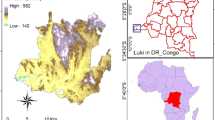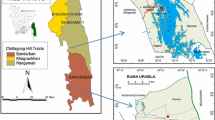Abstract
A survey was conducted to obtain information about the use of forest products by rural women for sustaining food and financial security at household level in the Nigerian rainforest zone. Data analysis reveals that the rural women are heavily engaged in harvesting, processing and marketing of forest products; collection of forest products is a specialised activity based on acquired skills and an ecological knowledge of the forests; and collection of medicinal plants is shrewd in secrecy and involves the performance of rituals. Net income generated from natural forests by rural women in the study area varies from about N23,000 to N113,080 per household per season. Forest regeneration has received little attention from both the rural communities and government and this tends to undermine sustained use of the forests.
Similar content being viewed by others

References
Carney, D. (1998), Changing Public and Private Roles in Agricultural Service Provision, Overseas Development Institute, London.
Dankelman, I. and Davidson, J. (1988), Women and Environment: Alliance for the Future, IUCN, London.
Lamprecht, H. (1978), ‘Desirability, potential and problems of natural regeneration in the tropics’, Plant Resources and Development, 7(10): 7–12.
Okafor, C.J. (1981), Inventory of Forest Resources in Relation to their Development and Utilisation, FAN Conference lecture, Akure, Nigeria.
Osemeobo, G.J. (1992a), ‘Fuelwood exploitation from natural ecosystems in Nigeria: socio-economic and ecological implications’, Journal of Rural Development, 11(2): 101–108.
Osemeobo, G.J. (1992b), ‘Effects of land use and collection on the decline of the African giant snails in Nigeria’, Environmental Conservation, 19(2): 153–159.
Osemeobo, G.J. (1993), ‘The hazards of rural poverty: decline in common property resources in Nigerian rainforest ecosystems’, Journal of Environmental Management, 38(3): 201–212.
Osemeobo, G.J. (2001a), ‘Give us ourland: tenure crisis in forest land use’, The Nigerian Journal of Forestry, 31(1): 21–26.
Osemeobo, G.J. (2001b), ‘Wild plants in everyday use: conservation towards sustainable livelihoods in Nigeria’, International Journal of Sustainable Development and World Ecology, 8(4): 369–379.
Osemeobo, G.J. (2004), Tropical Rainforest in Poverty Alleviation: Economics of Alternative Forestland Uses for Rural Livelihoods in Nigeria, a study commissioned by FAO, Rome.
United Nations Development Programme (1998), Nigerian Human Development Report, UNDP, Lagos.
Wold Bank (1996), Nigeria Poverty in the Midst of Plenty: The Challenge of Growth with Inclusion, World Bank, Lagos.
Author information
Authors and Affiliations
Rights and permissions
About this article
Cite this article
Osemeobo, G.J. Living on the forests: Women and household security in Nigeria. Small-scale Forestry 4, 343–357 (2005). https://doi.org/10.1007/s11842-005-0021-x
Issue Date:
DOI: https://doi.org/10.1007/s11842-005-0021-x



